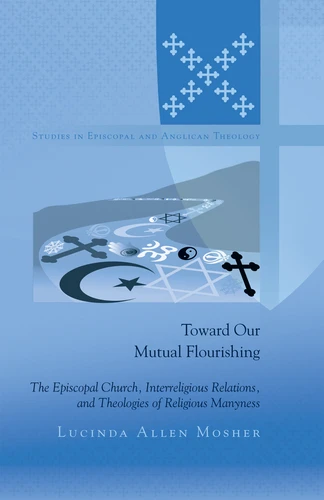Toward Our Mutual Flourishing. The Episcopal Church, Interreligious Relations, and Theologies of Religious Manyness
Par :Formats :
- Paiement en ligne :
- Livraison à domicile ou en point Mondial Relay indisponible
- Retrait Click and Collect en magasin gratuit
- Nombre de pages189
- ISBN978-1-4331-1937-8
- EAN9781433119378
- Date de parution01/10/2012
- CollectionStudies in Episcopal and Angli
- ÉditeurPeter Lang
Résumé
In Toward Our Mutual Flourishing : The Episcopal Church, Interreligious Relations, and Theologies of Religious Manyness, the author tells the story of The Episcopal Church's development of an official rationale for its ongoing engagement with religious diversity. At once a work of historical, moral, and practical theology, this volume contextualizes and explains what one church teaches about how religious difference may be interpreted in Christian terms.
Through guided reading of noteworthy documents, this book explores such themes as this church's preference for ecumenical interfaith work, its particular attention to Christian-Jewish and Christian-Muslim concerns, the relationship between missiology and theological understanding of religious diversity, and the intersection of interreligious relations with other ecclesial concerns – peace and justice activism, liturgical reform efforts, and what it means to be "the Body of Christ" in the twenty-first century.
The author thus positions this multinational, multicultural, multilingual denomination within the Interfaith Movement, the Anglican theological tradition, and the various schemes for analyzing Christian theologies of religions. About The Episcopal Church (but not just for Episcopalians), about Christianity (but not just for Christians), this book is an excellent resource for courses in interreligious dialogue, Christian ethics, and American religious history.
Through guided reading of noteworthy documents, this book explores such themes as this church's preference for ecumenical interfaith work, its particular attention to Christian-Jewish and Christian-Muslim concerns, the relationship between missiology and theological understanding of religious diversity, and the intersection of interreligious relations with other ecclesial concerns – peace and justice activism, liturgical reform efforts, and what it means to be "the Body of Christ" in the twenty-first century.
The author thus positions this multinational, multicultural, multilingual denomination within the Interfaith Movement, the Anglican theological tradition, and the various schemes for analyzing Christian theologies of religions. About The Episcopal Church (but not just for Episcopalians), about Christianity (but not just for Christians), this book is an excellent resource for courses in interreligious dialogue, Christian ethics, and American religious history.
In Toward Our Mutual Flourishing : The Episcopal Church, Interreligious Relations, and Theologies of Religious Manyness, the author tells the story of The Episcopal Church's development of an official rationale for its ongoing engagement with religious diversity. At once a work of historical, moral, and practical theology, this volume contextualizes and explains what one church teaches about how religious difference may be interpreted in Christian terms.
Through guided reading of noteworthy documents, this book explores such themes as this church's preference for ecumenical interfaith work, its particular attention to Christian-Jewish and Christian-Muslim concerns, the relationship between missiology and theological understanding of religious diversity, and the intersection of interreligious relations with other ecclesial concerns – peace and justice activism, liturgical reform efforts, and what it means to be "the Body of Christ" in the twenty-first century.
The author thus positions this multinational, multicultural, multilingual denomination within the Interfaith Movement, the Anglican theological tradition, and the various schemes for analyzing Christian theologies of religions. About The Episcopal Church (but not just for Episcopalians), about Christianity (but not just for Christians), this book is an excellent resource for courses in interreligious dialogue, Christian ethics, and American religious history.
Through guided reading of noteworthy documents, this book explores such themes as this church's preference for ecumenical interfaith work, its particular attention to Christian-Jewish and Christian-Muslim concerns, the relationship between missiology and theological understanding of religious diversity, and the intersection of interreligious relations with other ecclesial concerns – peace and justice activism, liturgical reform efforts, and what it means to be "the Body of Christ" in the twenty-first century.
The author thus positions this multinational, multicultural, multilingual denomination within the Interfaith Movement, the Anglican theological tradition, and the various schemes for analyzing Christian theologies of religions. About The Episcopal Church (but not just for Episcopalians), about Christianity (but not just for Christians), this book is an excellent resource for courses in interreligious dialogue, Christian ethics, and American religious history.

